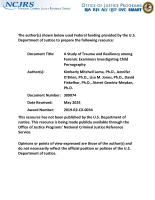Just Family Support During Death Investigations
In episode three of our Supporting Medicolegal Death Investigators mini season, Just Science sat down with Rebecca Reid, Laramie County Coroner in Wyoming, and Meghan Clarke, Family Advocate Coordinator at the Denver Office of the Medical Examiner, to discuss the development of new roles in MDI offices that focus on providing support to the families of decedents. On a daily basis, the staff of medical examiner and coroner offices encounter grieving families who are in need of compassion, resources, or just a listening ear.





